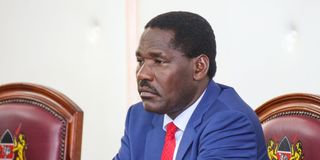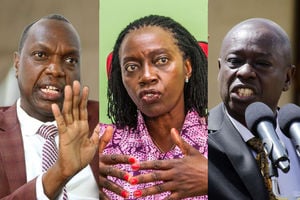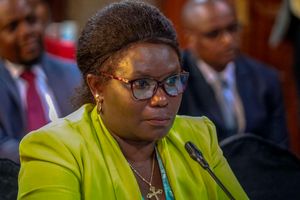
From left: Former Meru Governor Kiraitu Murungi, Governor Kawira Mwangaza, Mithinka Linturi and Peter Munya.
Kawira Mwangaza. Kiraitu Murungi. Mithinka Linturi. Peter Munya. Four political bigwigs in the quaint county of Meru have shaped its political dynamics for more than a decade now. And four political bigwigs who have tested the very basis of democracy in one of the most politically hostile regions in the country.
Some of these four came out unscathed. Others survived with a limp. And others are still on the firing line, facing a barrage of accusations and indictments from both within and outside their camps, and in the process putting Meru County higher up there in the hierarchy of the regions with the most divisive, conflict-ridden political regimes in recent memory.
To understand what is happening here, we have spent weeks talking to the residents, interviewing political activists, poring over mountains of literature, and generally listening to the pulse of this land of diverse cultures and postures.
In the end, we have come up with an uncomfortable conclusion: the battle for Meru is not one for the ethos of democracy and governance; but that of the elites and commoners rising up against each other for the control of the county’s wealth. And the electorate, like deer caught in the headlights of a truck, is the vulnerable, defenseless victims of this vicious battle.
On the surface, Meru County is a peaceful agricultural region famed for its miraa and coffee farms. Sitting on the farthest, north-easterly frontier of the Mt Kenya region, the county’s peaceful rural villages make it a pleasant place to live and work. But scratch the surface and the county suddenly presents a damning land of strong contrasts politically, socially and economically.
Here, you are either a Kiraitu Murungi, a Peter Munya, a Mithika Linturi or a Governor Kawira Mwangaza stalwart. There are no in-betweens, or ifs, here. In Meru, political affiliations are absolute.
That, perhaps, explains why in a span of just a year, between December 2022 and 2023, Governor Mwangaza survived three attempts at ousting her from office after being unsuccessfully impeached twice.
Ms Mwangaza, who likes to refer to herself as ‘Bishop’ because she runs an evangelical ministry here, made history in the August 9, 2022 elections when she trounced two political titans to clinch the seat.
Neither the incumbent Kiraitu Murungi nor the political heavyweight and former Senator Mithika Linturi could believe it when the cantankerous Mwangaza was declared winner, and while both have gone on to establish successful lives outside the county, the embers of the fires they lit here still burn with a fierceness that is only reserved for Meru.
Mr Murungi now runs his legal consultancy while Mr Linturi is the Agriculture Cabinet Secretary.

Meru Governor Kawira Mwangaza.
In the race, Ms Mwangazi garnered an impressive 209,148 votes to secure the gubernatorial seat at the first time of asking, with Mr Linturi coming in second with 183,858 votes and Mr Murungi managing 110,814 votes.
Seen as a non-starter by her competitors, the 50-year-old led in six out of nine sub-counties, defeating Mr Murungi even in his own home turf of Imenti South, where she garnered 31,921 votes against the ex-governor’s 22,359 votes.
With this victory in a shamelessly patriarchal enclave of the country, the former Woman Representative became only the second Meru female leader to be elected into office, without the benefit of affirmative action, after the short-lived political career of Ms Annrita Karimi, who won the South Imenti parliamentary seat in 1975 but was dramatically kicked out 18 months later.
The first impeachment attempt against Ms Mwangaza, later quashed by the Meru High Court, was introduced by MCA Dennis Kiogora of Abogeta West Ward. Two more have followed but have never succeeded in sending her home.
Our deep-dive tour of this region took us to its farthest corners, where life is a luxuriant mixture of hope, faith and agriculture. The rolls of the tongues of the people of Meru are informed by three dialects – Imenti, Igembe and Tigania – and these, as we came to understand much later on, are not just linguistic variants, but features that play a critical role in the county’s politics.
With a population of over 1.5 million people according to the 2019 national census, the county has nine constituencies: Tigania West, Tigania East, Igembe Central, Igembe South, Igembe North, South Imenti, North Imenti, Central Imenti and Buuri. The county has 45 wards, with South Imenti having six and Buuri four, while the remaining seven have five wards each.
Igembe Central is the most populous, with 221,412 people, followed by South Imenti with 206,506 people. However, the latter lead in registered voters, at 115,642, according to IEBC 2022 elections data, while the former boasts 93,434 voters, coming a close third after North Imenti, which has 96,241 voters.
But in terms of the three regions, as dictated by the dialects or sub-tribes, Imenti has 370,719 registered voters followed by Igembe with 247,610 and Tigania with 153,810 voters.

Agriculture Cabinet Secretary Mithika Linturi.
Politically, it is only the Igembe region which is yet to produce a governor as the founding governor, Peter Munya, hails from Tigania while his successor, Mr Murungi, is from Imenti. Mr Raphael Muriungi, the deputy governor during Mr Munya’s tenure, is the closest Igembe has come to the coveted seat.
The last election, therefore, was dubbed here as the turn for Igembe to rule the county, but Ms Mwangaza, who hails from Buuri in the Imenti region, turned the tables on Igembe’s son, Mr Linturi. Igembe was not amused, and the region has never rested since then.
Running on an independent ticket, Ms Mwangaza deployed a masterful campaign tactic when she picked little-known prison warder and preacher, Rev Isaac M’Ethinkia Mutuma, from Mr Linturi’s Igembe South constituency as her running mate. On the other hand, Mr Linturi, running on a UDA ticket, went to North Imenti and settled on the youthful advocate Linda Kiome, with his eyes on the women and youth votes, especially from the vote-rich Imenti area.
For his part, Devolution Empowerment Party (DEP) boss Kiraitu Murungi maintained his deputy, Titus Ntuchiu, from Tigania West, as his running mate in a bid to increase his chances of capturing the region’s votes as his predecessor was not in the race.
Beaten in their own game, and smarting from the cruelty of the political dynamics here, several leaders from the county have been pushing for the splitting of the county into two -- Imenti and Nyambene – the latter of which will comprise Igembe and Tigania regions.
But, talking to the locals who are caught in this vicious battle, one gets the sense that, although regional politics played a part in the 2022 elections, the battle was more between the perceived commoners and the elites, with the governor destabilising the political status quo held by the latter. It was a hustler vs dynasty duel in the truest conceptions of the William Ruto manifesto, but it had inklings of a class divide that sent Ms Mwangaza right past the gates.
The residents say Governor Mwangaza has warmed her way into the hearts of the ‘illiterate’, mostly in the villages where the largest voting bloc lives, and therefore her victory in the 2022 elections is just a matter of when not if.

Former Meru Governor Kiraitu Murungi (centre) alongside his wife, Priscilla, during the launch of the Happiness Club of Kenya at the Sarova Panafric on March 20, 2024. Next to them is Prof PLO Lumumba, the guest speaker at the event.
Indeed, Mr Murungi, writing for the Sunday Nation soon after the elections, noted that “there was a strong unducurrent created by my opponents which painted me as a ‘dynasty’.”
“Villagers were told that we rich men were only interested in our wealth and privileges and did not care about them,” he continued. “There were rumours among mama mbogas, boda bodas and small scale traders that I insulted them and called them chokoras (street children), which was not true.”
So, a class-divide angle arises here. But Mr Edwin Kiongozi, a popular political strategist in Meru, says the people have no problem with Ms Mwangaza, and that the politics of 2022 was a matter of a venomous supremacy battle among elected leaders.
He claims that some leaders have been doing everything within their powers to paint Ms Mwangaza in bad light because she is constantly on the ground and has also blocked all corruption loopholes, therefore denying many leaders avenues to get county tenders.
“Her new leadership style has rattled other leaders. She is working with the people and not lining politicians’ pockets to gain favours. That is why they organised to boo her during President Ruto’s recent visit to show that she is not wanted,” says Mr Kiongozi. His sentiments are echoed by Gerald Aranju, chairperson of Laare miraa traders’ association, who says Governor Mwangaza has managed to weed the county government of cartels who are now fighting back.
At the bus stage in Imenti North, matatu driver Edward Mutwiri says the governor is a darling to the people because she is a “true hustler”.
“She has been a hustler even way before she joined politics. She started out here as a conductor before graduating to a matatu driver. The kaende kaende, kabati kabati slogan is a popular phrase we use here as matatu conductors and drivers,” says Mr Mutwiri.

Former Meru Governor Peter Munya.
But many others think Ms Mwangaza is inept, incompetent and unskilled as a leader. Submissions in the county assembly as well as in the Senate have also suggested that she is corrupt, even though she has successfully fought off these indictments.
Now, as 2027 the gubernatorial draws closer, Meru is caught in the snare of a charged political season. Thrown deep into the current political wrangles are area Senator Kathuri Murungi, Mr Linturi, as well as allied MPs and MCAs. At the periphery are MP Mpuru Aburi, who is said to also be harbouring ambitions of becoming a governor; and perhaps Mr Munya, who still retains political clout here.
Ms Mwangaza made her first stab at politics in 2012 when she vied for Buuri MP but lost to Boniface Gatobu. In 2017, she vied for the Woman Representative seat as an independent candidate and trounced Ms Florence Kajuju.
“She learnt a lot from the loss because she is quite an intelligent person. In 2015, she established Baite TV and the Okolea programme to give her more reach,” avers Ms Karambu. Baite TV went on become her campaign programme, leading to complaints that she was abusing her television frequency for political expediency. And she was still fresh in the governor’s seat when the MCAs struck.
Meru County Assembly Minority Leader Mwenda Ithili says the problem between the governor and the MCAs is over an unfulfilled Sh15 million ward development fund promise, and Ms Mwangaza’s refusal to be accountable to the assembly.
“She is doing things her own way and she does not want to be held accountable. When you correct the governor, it becomes an issue,” says the Akithi Ward MCA. “If you do not sing the Governor ni Mama song, then your ward is sidelined. Our aim is not to impeach her but try to have a working governor. However, she has refused to change.”
We suggested that perhaps, as it was claimed in the Senate, she is being fought because she is a woman, but Ms Karambu rejected the argument, saying even though “Meru is a patriarchal society, Ms Mwangaza was elected, not because of her gender, but her track record”.
“Impeachments have nothing to do with her gender,” she added.
Nominated MCA Mwenda Kirinya said Governor Mwangaza was voted for by Meru voters, so “this is a question of a governor who is not able to perform her functions as expected” and “the fight against her has nothing to do with a patriarchal society or gender”.
But Gideon Kimathi, now an economic advisor in the office of the governor after having served as the Chief of Staff in Mr Murungi’s administration, says the troubles facing Ms Mwangaza were just a matter of time coming.
He says the governor is in trouble for destabilising the political status quo, and also because she is a woman.
“I was in DEP then so I know what was happening. They said that even if she wins, they will remove her because they cannot be led by a woman. She was referred to as a commoner who was not affiliated to any party,” he claims.
The economic advisor says the wrangles are not unique to Governor Mwangaza alone as previous governors also faced similar predicaments but what saved them was having a party that had MCAs and other leaders who could help them fight back. Mwangaza, an independent, is on her own and must carry her cross.
Former majority leader Evans Mawira, who lost the majority seat early this year after shifting political allegiance to the governor, admits that there is more to the political upheavals in the county than meets the eye, and accuses external forces of capturing the assembly and fueling the wrangles.
He claims there were two meetings in Nairobi spearheaded by a Cabinet Secretary and a Senator ahead of last year’s impeachment. The MCA said the meetings were held at Sunstar Hotel and a Tigania MP’s house and brought together all elected MPs and MCAs to strategise on how to impeach the governor.
A post-mortem meeting after the failed impeachment push was then held at Sportsman's Arm Hotel in Nanyuki, where a Senator was accused of not properly executing the impeachment plan in the Senate.
Senator Murungi, who has been mentioned as among those who attended the meetings, laughed off the claims, saying he and his peers just wanted to understand the grounds the MCAs had against the governor.
“Nobody conspired to impeach the governor. Meru has a crop of well-informed MCAs whom we cannot tell what to do. We are also not micromanaging what is happening in the county,” said the Senate deputy speaker.
He added: “Elected MPs are not involved in the day-to-day running of the county; the buck stops with the governor. If the governor had listened to me, all these issues would not have happened. Nobody is fighting her. If she is able to work with the MCAs, then the impeachments will not happen.”
There have also been claims that the fallout between the governor and her deputy stems from failure to honour a pre-election agreement on the constitution of the county cabinet, with the former accusing Mr Mutuma of failing to deliver votes from Igembe.











